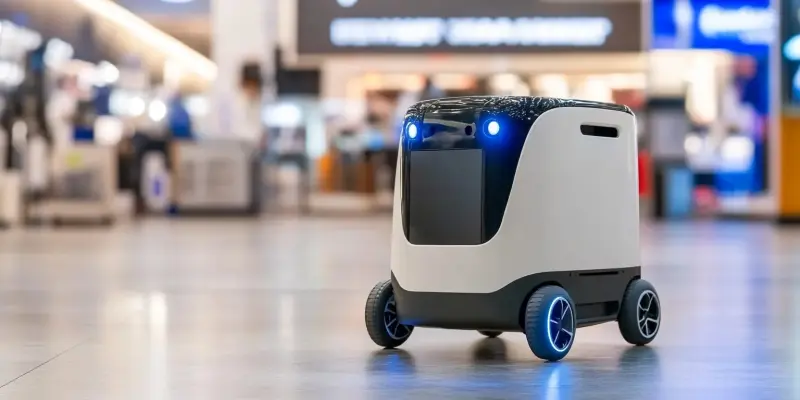In a constantly evolving technological landscape, the global mobile robot market has emerged as a critical component for manufacturing and retail sectors’ automation strategies. However, recent assessments indicate that the market’s growth rate is projected to be slower than initially anticipated due to ongoing global macroeconomic challenges. According to market research firm Interact Analysis, global mobile robot sales are still expected to experience substantial growth, reaching $5.5 billion by 2024, with an annual growth rate exceeding 20% up to 2030. Despite this promising outlook, the firm has adjusted its 2027 forecast for the global market downward by 18%.
Impact of Macroeconomic Challenges on Growth
Delayed Automation Investments in Manufacturing and Retail
One of the major factors contributing to the tempered growth expectations in the global mobile robot market is the challenging economic climate. The uncertainty surrounding global economies has led manufacturers and retailers to delay their automation investments. The retail industry, in particular, is still adjusting to the aftereffects of the COVID-19 pandemic, as businesses strive to return to pre-pandemic levels of operation. This delay in investments has consequently slowed the anticipated uptake of mobile robot technologies in various sectors, impacting the overall market growth.
Additional factors exacerbating the situation include geopolitical risks such as national elections and ongoing conflicts in regions like Ukraine and the Middle East. These geopolitical tensions have led to heightened energy costs and supply chain disruptions, further complicating the landscape for businesses considering automation. Higher energy costs, in particular, have placed additional financial strain on companies, making it difficult for them to allocate funds toward technological advancements. Consequently, these challenges have collectively contributed to a more cautious approach in adopting mobile robot solutions, resulting in slower but steady market growth.
Commitment to Automation Despite Uncertainties
Despite the prevailing economic uncertainties and challenges, companies remain steadfast in their commitment to automation. Businesses recognize the importance of automation to mitigate risks associated with labor shortages, rising wages, and broader economic uncertainties. Automation ensures business continuity and resilience during unpredictable times. For instance, major retailers like Amazon are significantly increasing their use of robotics to enhance operational efficiency, reduce costs, and improve worker safety. These strategic investments in automation demonstrate a clear commitment to leveraging cutting-edge technologies to maintain a competitive edge and ensure sustainable business practices.
Ash Sharma, Chief Commercial Officer and Vice President of Research for Robotics and Warehouse Automation at Interact Analysis, emphasized that the industry is still experiencing considerable growth. However, the rate of growth is not as rapid as previously expected. Sharma’s observations align with the report’s findings, which indicate that the customer uptake of mobile robots will grow at a linear rate rather than the exponential growth initially anticipated. Another factor contributing to the steadier growth trajectory is the slower decline in prices for mobile robots. Rising labor costs have prevented a significant drop in prices, which in turn has not spurred a rapid increase in demand.
Market Resilience and Future Outlook
Steady Growth Trajectory and Operational Resilience
The report from Interact Analysis offers a nuanced but optimistic view of the global mobile robot market. Despite the slower-than-expected growth rate, the market is poised for steady and sustainable development in the coming years. Companies are strategically investing in mobile robot technologies to address various operational challenges, such as labor shortages and the need for enhanced efficiency. These efforts are crucial for maintaining operational resilience in the face of ongoing economic and geopolitical uncertainties.
Furthermore, the ability of companies to adapt and respond to these challenges will play a pivotal role in shaping the future of the mobile robot market. Businesses that proactively integrate automation into their operations are likely to gain a competitive advantage, ensuring long-term success and stability. The commitment to continuous improvement and technological innovation underscores the industry’s resilience and potential for growth, albeit at a more moderate pace.
Addressing Labor Issues and Ensuring Continuity
In an ever-changing tech landscape, the global mobile robot market has become essential for automating manufacturing and retail operations. Recent evaluations, however, show that the market’s growth will be slower than initially expected due to ongoing global macroeconomic challenges. Market research firm Interact Analysis projects global mobile robot sales to continue growing, reaching $5.5 billion by 2024, with an annual growth rate topping 20% up to 2030. Despite this optimistic outlook, the firm has adjusted its 2027 forecast downward by 18%. This recalibration reflects current economic pressures and highlights the complexities these industries face. Even with these adjustments, the market’s future remains promising as businesses continue to invest in automation technologies to improve efficiency and reduce costs. The expected growth underscores the increasing reliance on mobile robots in various sectors, and despite the revised forecast, the market is poised for substantial advances in the coming years.

